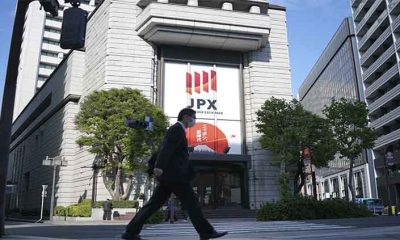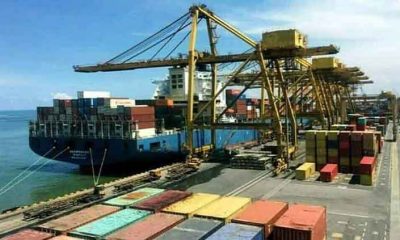Business
Pakistan to send high-level delegation to US for tariff, trade talks

The government is set to send a high-level delegation to the United States to promote trade relations and discuss a 29 per cent tariff that has been imposed on goods the US imports from Pakistan, the Prime Minister’s Office (PMO) said on Wednesday.
As the US imposed heavy levies on dozens of allies and rivals alike on April 2, Pakistan was hit by a 29pc tariff on goods it exports to the US, which economists say could bring immediate hurdles but also long-term opportunities.
According to a press release issued by the PMO, the decision to send a delegation was made during a meeting chaired by PM Shehbaz Sharif in Islamabad today to discuss the trade tariff imposed by the US.
“On the directives of the prime minister, the delegation will also include renowned business persons and exporters,” the statement said, without specifying which government officials would be part of the team.
“The delegation has been tasked by the prime minister to work out a mutually beneficial course of action for the future after negotiations on the new tariffs imposed by the US on imports,” the PMO said.
“Trade relations between Pakistan and America span decades,” PM Shehbaz was quoted as saying in the statement.
“The government is keen to further strengthen trade partnership with the US,” the premier added.
During the meeting, the prime minister was presented with a report by the Steering Committee and Working Group on the tariff imposed by the US and the proposed future course of action, the PMO statement said.
Various alternative courses of action were also presented during the meeting.
The meeting was told that Pakistan’s Embassy in the US was in “constant” contact with the Trump administration.
Deputy PM Ishaq Dar, Finance Minister Muhammad Aurangzeb, Special Assistant to PM Tariq Fatemi, among others, were present during the meeting, according to the statement.
The development comes as the Pakistan Stock Exchange (PSX) earlier today declined by over 2,600 points, as additional US tariffs on Chinese imports reached 104pc.
This followed Monday’s bloodbath at the PSX when shares plunged by 3,882 points amid rising fears of a global recession after US President Donald Trump imposed “reciprocal” tariffs on dozens of rivals and allies alike.
Meanwhile, a US official conveyed the interest of US companies to invest in the country’s mineral sector, state-run Radio Pakistan reported.
A US delegation led by Eric Meyer, a senior bureau official (SBO) for the Bureau of South and Central Asian Affairs at the US State Department, met with PM Shehbaz in Islamabad today.
Trump’s new tariffs take effect, with 104pc on Chinese goods
Trump’s punishing tariffs on dozens of economies came into force on Wednesday, including 104pc in levies against Chinese goods, sending markets into a tailspin again as the devastating global trade war intensified.
Following the sweeping 10pc tariffs that took effect over the weekend, rates on imports to the United States from exporters like the European Union or Japan rose further at 12:01am (9:01am PKT) on Wednesday.
China – Washington’s top economic rival but also a major trading partner — is the hardest hit, with tariffs imposed on its products since Trump returned to the White House now reaching a staggering 104pc.
Read More: Trump threatens to hike China tariffs further as market plunge continues
Trump said on Tuesday his government was working on “tailored deals” with trading partners, with the White House saying it would prioritise allies like Japan and South Korea.
His top trade official, Jamieson Greer, also told the Senate that Argentina, Vietnam and Israel were among those who had offered to reduce their tariffs.
Trump told a dinner with fellow Republicans on Tuesday night that countries were “dying” to make a deal.
“I’m telling you, these countries are calling us up kissing my a**,” he said.
But Beijing has shown no signs of standing down, vowing to fight a trade war “to the end” and promising countermeasures to defend its interests.
China’s retaliatory tariffs of 34pc on US goods are due to enter in force at 12:01am local time on Thursday (9:01pm PKT Wednesday).
The US president believes his policy will revive America’s lost manufacturing base by forcing companies to relocate to the United States.
But many business experts and economists question how quickly — if ever — this can take place, warning of higher inflation as the tariffs raise prices.
Trump said Tuesday the United States was “taking in almost $2 billion a day” from tariffs.
Trump originally unveiled a 34pc additional tariff on Chinese goods.
But after China countered with its own tariff of the same amount on American products, Trump piled on another 50pc duty.
Counting existing levies imposed in February and March, that takes the cumulative tariff increase for Chinese goods during Trump’s second presidency to 104pc.
Trump has insisted the ball was in China’s court, saying Beijing “wants to make a deal, badly, but they don’t know how to get it started”.
Late Tuesday, Trump also said the United States would announce a major tariff on pharmaceuticals “very shortly”.
Separately, Canada said that its tariffs on certain US auto imports will come into force Wednesday.
Meltdown
After trillions in equity value were wiped off global bourses in the last days, markets in Asia came under pressure again on Wednesday, with Hong Kong plunging more than 3pc and Japan’s Nikkei sinking 2.7pc.
The markets accelerated their losses as the new tariffs came into effect, with Taiwan stocks closing down 5.8pc in the afternoon.
Ahead of European markets’ open, stock futures were also indicating steep drops ahead.
Foreign exchange markets likewise witnessed ructions, with the South Korean won falling to its lowest level against the dollar since 2009 this week.
China’s offshore yuan also fell to an all-time low against the US dollar, as Beijing’s central bank moved to weaken the yuan on Wednesday for what Bloomberg said was the fifth day in a row.
Analyst Stephen Innes, however, said that “letting the yuan grind lower at this measured pace won’t offset the blow from a full-blown tariff barrage”.
“The levies are simply too big. China is trying to thread the needle, but the runway is short,” he warned.
Oil prices slumped, with the West Texas Intermediate closing below $60 for the first time since April 2021.
Read Also: Oil prices climb 1pc after heavy US tariff-driven selloff
Global benchmark bonds, assets perceived as relatively safe, were also caught up in the market turmoil on Wednesday, an unnerving turn towards forced selling and a dash for the safety of cash.
EU wants to avoid ‘further escalation’
The European Union has sought to cool tensions, with the bloc’s chief Ursula von der Leyen warning against worsening the trade conflict in a call with Chinese Premier Li Qiang.
She stressed stability for the world’s economy, alongside “the need to avoid further escalation,” said an EU readout.
The Chinese premier told von der Leyen that his country could weather the storm, saying it “is fully confident of maintaining sustained and healthy economic development”.
The EU — which Trump has criticised bitterly over its tariff regime — may unveil its response next week to new 20pc levies it faces.
In retaliation against US steel and aluminum levies that took effect last month, the EU plans tariffs of up to 25pc on American goods ranging from soybeans to motorcycles, according to a document seen by AFP.
German Finance Minister Joerg Kukies said on Wednesday that Europe’s largest economy is at risk of another recession as a result of the trade tensions.
Investment bank JP Morgan estimates there is a 60pc chance of the world economy entering recession by year-end.
In one public sign of friction over tariffs, key Trump ally Elon Musk described senior White House trade advisor Peter Navarro as “dumber than a sack of bricks”.
Musk, who has signalled his opposition to Trump’s trade policy, hit out after Navarro described his Tesla company as a “car assembler” that wants cheap foreign parts.
Business
Wall Street poised to add to last week’s gains when markets open Monday

Wall Street was poised to add to last week’s gains when markets open on Monday as investors juggle incoming corporate earnings along with possible tariff updates from the U.S. and its trading partners.
Futures for the S&P 500 gained 1.4% before the bell Monday, while futures for the Dow Jones Industrial Average rose 1%. Nasdaq futures were up 1.7%.
Shares rose in technology companies that stood to be hit hardest by the U.S. tariffs against China after President Donald Trump said he was temporarily exempting smartphones, computers and other electronics from the import fees.
Apple jumped close to 6% in premarket trading Monday, with computer maker Dell and chipmaker Super Micro Computer also up by about the same amount.
Goldman Sachs rose 1.5% after the New York investment bank topped Wall Street’s first-quarter earnings and revenue targets.
Coming later this week are the latest financial results from Bank of America, United Airlines and Netflix, among others.
The Chinese Ministry of Commerce said Trump’s weekend tariffs move was “a small step” toward fixing its wrongful action of what the U.S. president calls reciprocal tariffs. China urged him to completely cancel them.
China had announced Friday that it was boosting its tariffs on U.S. products to 125% in the latest tit-for-tat increase following Trump’s escalations on imports from China.
Hong Kong’s Hang Seng jumped 2.4% to 21,417.40, while the Shanghai Composite index picked up 0.8% to 3,262.81 after the government reported that China’s exports surged 12.4% in March from a year earlier in a last-minute flurry of activity as companies rushed to beat increases in U.S. tariffs imposed by Trump.
The Taiex fell 0.1% in Taiwan, whose economy is heavily dependent on exports of computer chips and other high-tech goods after Trump said the new chip tariffs will be announced “over the next week.”
The friction between the world’s two largest economies could cause widespread damage and a possible global recession, even after Trump recently announced a 90-day pause on some of his tariffs for other countries, except for China.
In early European trading, Germany’s DAX gained 2.4%, the CAC 40 in Paris was up 2.1% and Britain’s FTSE 100 added 1.7%.
Asian shares logged sturdy gains. Japan’s Nikkei 225 rose 1.2% to 33,982.36 and South Korea’s Kospi gained 1% to 2,455.89.
Shares in technology companies surged, with Tokyo Electron up 1.4% and Advantest, a testing equipment maker, up 4.9%. South Korea’s biggest company, Samsung Electronics, gained 1.8%.
Australia’s S&P/ASX 200 added 1.3%, closing at 7,748.60.
On Friday, the S&P 500 rose 1.8%, capping a chaotic and historic week. The Dow gained 1.6% and the Nasdaq composite jumped 2.1%. For the week, they each logged gains between 5% and 7%.
Stocks kicked higher as pressure eased a bit from within the U.S. bond market, which was flashing serious warning signals last week that drew Trump’s attention.
The yield on the 10-year Treasury eased to 4.44% early Monday. On Friday, it topped 4.58% in the morning, up from 4.01% a week ago. That’s a major move for a market that typically measures things in hundredths of a percentage point.
U.S. benchmark crude oil reversed early losses, gaining 83 cents to $62.33 per barrel. Brent crude, the international standard, climbed 81 cents to $65.57 per barrel.
The U.S. dollar dropped to 143.06 Japanese yen from 143.91 yen. The euro climbed to $1.1404 from $1.1320.
Business
Thailand says to discuss tariffs with United States on April 21

Thailand’s finance and commerce ministers will lead a delegation to the United States to meet Trump administration officials and push for relief from planned heavy tariffs, a government spokesperson said on Monday.
An advance team led by Finance Minister Pichai Chunhavajira will travel to the United States on Thursday for meetings with private sector groups, with Commerce Minister Pichai Naripthaphan to join later, spokesperson Jirayu Houngsub said.
The Thai delegation expects to meet with US government representatives on Monday, April 21, he said.
Thailand is facing a 36% tariff under US President Donald Trump’s trade measures, and is hoping to use a 90-day pause on the levies to prepare a response.
The United States was Thailand’s largest export market last year with shipments of $55 billion. Washington has put its bilateral trade deficit with Thailand at $45.6 billion.
Thailand’s strategy will focus on industries where the US and Thailand share interests, such as pet food, opening markets, and increasing US imports, Jirayu said.
He also said there would be stricter inspections on Thai exports to ensure other countries were not using Thailand to circumvent US taxes.
Thai officials have previously said they would increase US imports, cut tariffs on corn and increase joint investments in the United States.
Business
China’s exports jump 12.4% in March as bigger US tariff hikes loom

China’s exports jumped 12.4% in March from a year earlier in a last-minute flurry of activity as companies rushed to beat increases in U.S. tariffs imposed by U.S. President Donald Trump, and analysts forecast sharp setbacks ahead.
Imports fell 4.3% to $211.3 billion in March, the customs administration reported, far exceeded by exports worth $313.9 billion, leaving a trade surplus of $102.6 billion.
“But shipments are set to drop back over the coming months and quarters,” Julian Evans-Pritchard of Capital Economics said in a report. “We think it could be years before Chinese exports regain current levels.”
China’s trade surplus surged to a record $992.2 billion in 2024 and its exports climbed 5.4%, helping to make up for sluggish growth at home as the country slowly recovers from a crisis in its property market and lingering impacts of the COVID-19 pandemic.
After taking office, Trump first ordered a 10% increase in tariffs on imports from China. He later raised that to 20%. Now, China is facing 145% tariffs on most of its exports to the United States, based on the most recent revisions in Trump’s trade policies. China has responded with 125% tariffs on U.S. products and other measures meant to pinch the U.S. where it hurts most, such as controls on exports of critical minerals needed in high-tech manufacturing, such as electric vehicle production.
U.S. flag themed wearables are displayed at the Yiwu International Trade Market in Yiwu, eastern China’s Zhejiang province, Thursday, April 10, 2025. (AP Photo/Ng Han Guan)
China’s trade surplus with the United States was $27.6 billion in March as its exports rose 4.5%. It logged a surplus of $76.6 billion with the U.S. in January-March even though exports were up only 2.3% the first two months of the year.
“Savvy U.S. importers likely saw tariff hikes coming in April onward and frontloaded imports,” ING Economics said in a report, but that trend is likely to fall off as importers use up their inventories while they watch for the latest twists and turns in unpredictable U.S. trade policy.
“As a result, it’s likely that direct trade between the U.S. and China will crater starting in April,” it said.
Trade data already show some impact from the higher tariffs, with exports of lower value-added items like shoes and clothing falling, while shipments of computer chips, household appliances and vehicles surged. China’s biggest exports in the first three months of the year were electronic machinery, a broad category that includes smart phones and laptops, and high-tech products, the report shows.
Workers pack fashion accessories for delivery at the Yiwu International Trade Market in Yiwu, eastern China’s Zhejiang province on Thursday, April 10, 2025. (AP Photo/Ng Han Guan)
China’s exports of rare earths fell nearly 11% in the first quarter of the year as Beijing tightened controls on the strategically vital materials used in electric vehicles and other high-tech products.
The customs data showed total exports from the world’s second largest economy rose 5.8% in the first three months of the year from a year earlier while imports sank 7%, leaving a trade surplus of $273 billion.
Late Friday, Trump exempted most computer-related goods from the higher China-specific tariffs, including laptops, smartphones and the components needed to make them, though his administration says he plans to announce those within days. Such products accounted for nearly $174 billion in U.S. imports from China last year.
Still, the harsh U.S. tariffs on Chinese products have raised questions about whether exporters might end up diverting their goods to other overseas markets as they give up on selling to American consumers due to the more than doubling of import duties.
The biggest increases in exports in March were to China’s Southeast Asian neighbors, which saw the dollar value of shipments from China jump 8% in March from a year earlier. Exports to Africa rose more than 11% and those to India by nearly 14%.
A customs administration spokesperson, Lyu Daliang, said China was facing a “complex and severe external situation” but that the sky would not fall. He pointed to China’s diversified export options and huge domestic market.
When asked about falling Chinese imports, he told reporters in Beijing that China has been the world’s second largest importer for 16 straight years, increasing its share of global imports from about 8% to 10.5%.
“At present and in the future, China’s import growth space is huge, and the large Chinese market is always a great opportunity for the world,” he said.
Chinese President Xi Jinping was visiting Vietnam on Monday as part of a regional tour that also will take him to Malaysia and Cambodia, giving him an opportunity to firm up trade ties with other Asian countries that also are facing potentially steep tariffs, though last week Trump delayed enforcing them by 90 days.
China’s exports to Vietnam jumped nearly 17% last month from a year earlier, while its imports fell 2.7%
-
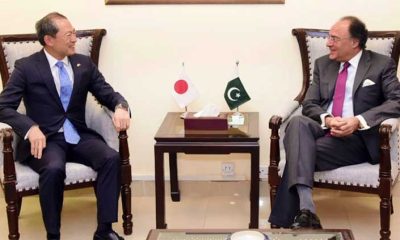
 Business3 months ago
Business3 months agoFinance Minister Aurangzeb discusses bilateral cooperation with Japanese envoy
-

 pakistan3 months ago
pakistan3 months agoSC additional registrar submits response to show-cause notice in contempt case
-

 Entertainment3 months ago
Entertainment3 months agoWhat Khalil-ur-Rehman Qamar feels about Mahira Khan
-

 Sports3 months ago
Sports3 months agoSwiatek powers into Raducanu clash as Fritz fires Melbourne warning
-
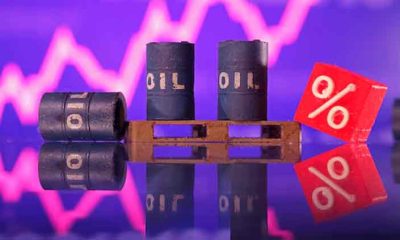
 Business3 months ago
Business3 months agoOil jumps on expectations new US sanctions to cut Russian supply
-

 Tech3 months ago
Tech3 months agoMicrosoft’s LinkedIn sued for disclosing customer information to train AI models
-
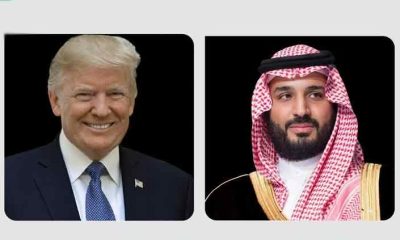
 World3 months ago
World3 months agoSaudi Arabia plans 600bn dollars in new US investment, trade over four years
-
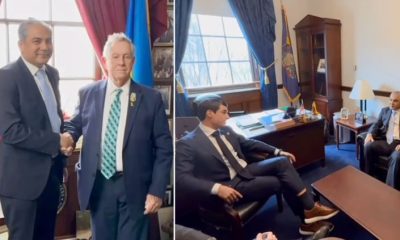
 pakistan3 months ago
pakistan3 months agoMohsin Naqvi sees new chapter in Pak-US relations under Trump







